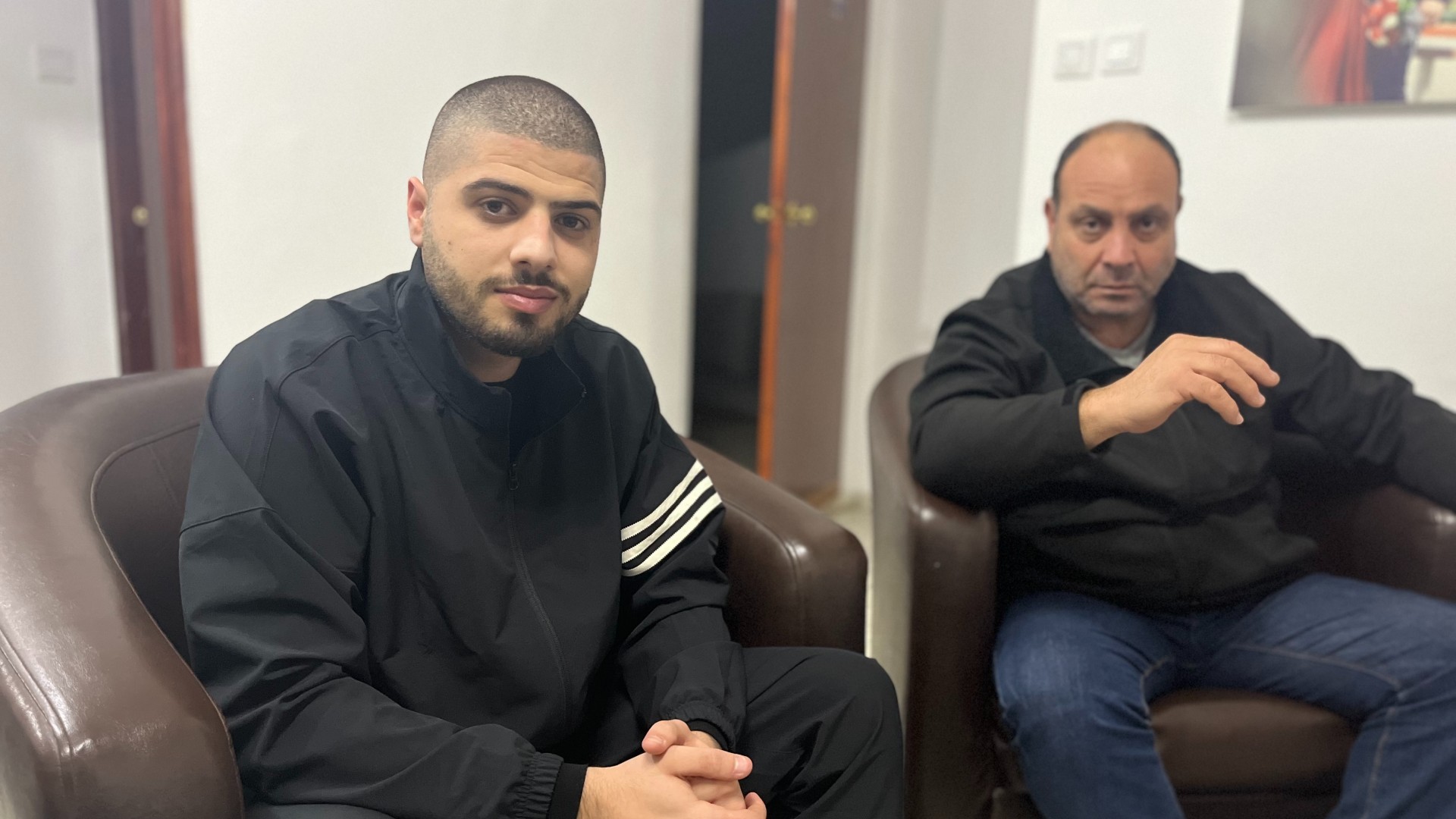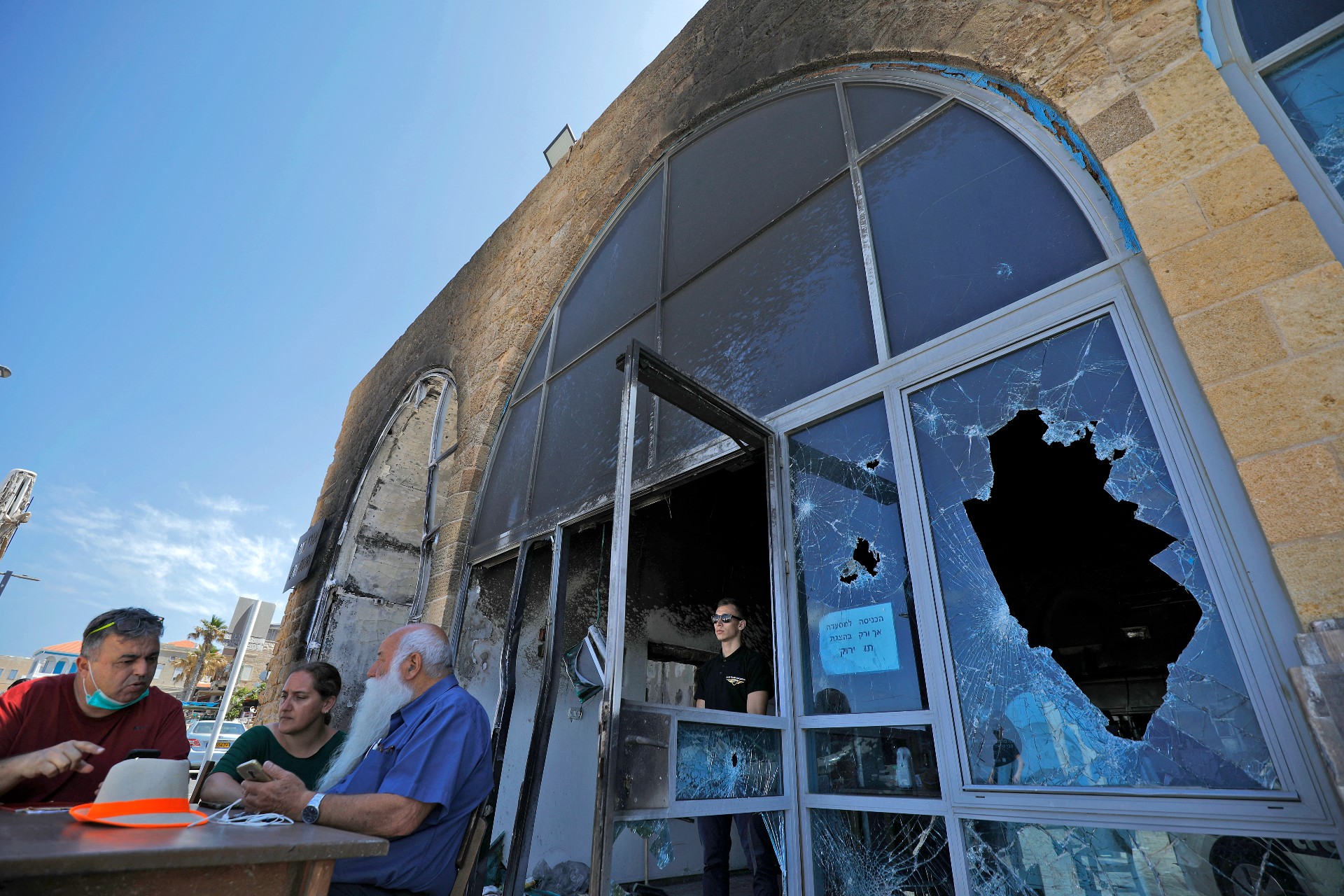Palestinian condemned to decade in prison over 2021 riots as Jewish Israelis walk free

In a rented flat miles away from his hometown of Acre (Akka), Adham Bashir spent his final days of freedom surrounded by family and friends.
The Palestinian citizen of Israel was sentenced to 10 years in prison by the district court in Haifa late last month over his participation in the May 2021 riots, when Israeli bombing of Gaza and violations in Jerusalem prompted violence and protests to break out in several mixed Jewish-Arab cities.
Sentences over that unrest have begun to be handed down to Jewish and Palestinian Israelis. Bashir’s is by far the longest.
The 25-year-old barber was convicted of severely beating an Israeli man due to “nationalist motives”, in a verdict the family says is unjust and disproportionate.
“I am still shocked by the verdict, I feel like I’m in hell,” Bashir’s mother Sabreen told Middle East Eye on Friday night, four days before his prison sentence was set to begin. “I don’t know how I will go home without Adham.”
New MEE newsletter: Jerusalem Dispatch
Sign up to get the latest insights and analysis on Israel-Palestine, alongside Turkey Unpacked and other MEE newsletters
On Tuesday morning, Bashir, emotional but defiant, said his final goodbyes and was taken to prison.
He is one of hundreds of Palestinian citizens who have been arrested and convicted since the riots rocked Israel for 11 days last year.
In the aftermath, Israeli police launched a widespread crackdown on those who took part in the violence. Despite Jewish Israelis carrying out many of the most brutal crimes, Palestinian citizens have been disproportionately singled out.
No one symbolises this better than Bashir. He received the highest sentence so far, with many fearing that longer sentences may follow for others who have cases still in court.
Many see it as just the latest attempt by Israeli authorities to crush Palestinian citizens’ self-identification through harsh collective punishment.
“The court decision is extremely alarming and leaves no doubts about the apartheid judicial system Israel is developing and enforcing against Palestinians,” says Ghadir Shafie, an activist from Acre. “Apartheid is being mainstreamed and posing an existential threat to all Palestinians.”
Swept up by police
Palestinian citizens of Israel, who make up around 20 percent of the population, have suffered under discriminatory laws and practices for decades.
Long ignored and marginalised, their frustrations erupted in May 2021, as mass protests engulfed Palestine and Israel against the bombing of Gaza, police storming of al-Aqsa Mosque and the threat of expulsion for families in Jerusalem’s Sheikh Jarrah.
During the 11 days of unrest, ultra-nationalist Israeli mobs attacked Palestinians in several Israeli cities, leading to inter-communal violence and a police crackdown on Palestinians.
On the first night of the protests, Moussa Hassouna was shot dead by Israeli rioters in Lydd (Lod). Two nights later, an Israel man in his car was attacked at an intersection by a group of Palestinians in Acre, a city that witnessed some of the worst violence. Mor Janashvili, 30, was seriously wounded and hospitalised.
After the incident, eight people were arrested. Among them was Bashir.
On 28 November, the Haifa district court convicted him of rioting and two charges designated as terrorist acts: aggravated assault and infliction of severe injury under aggravated circumstances.
He was sentenced to 10 years in prison and ordered to pay 150,000 shekels ($43,600) to the victim of the attack after pleading guilty in a plea deal.
Six people in the same case are awaiting verdict and one other person, Bilal Hilwani, was sentenced to a year in prison for rioting.
Bashir told MEE he went out that day when he saw a car accident, and did not intend to hurt anyone.
“The police claims are untrue, I did not participate in the physical assault,” Bashir said. “This was a trial by the media, there had been a big incitement camping against me, I was a scapegoat.”
Bashir was arrested a day after the 12 May attack. He spent more than 40 days in interrogations, which he said were conducted by Israel’s internal security agency, the Shin Bet, and included various violations of his rights.
“They denied me an attorney and isolated me from the world. In 42 days, I saw an attorney only once, on the 11th day, and for a very brief period,” he said.
“I was pressured and mistreated. They spat at me, denied me food and cigarettes, and said things about my mother and sister that I cannot repeat. They wanted to break me.”
'They have destroyed his life'
On 24 June 2021, Bashir was formally charged. He was deported to Shefa-Amr, a city 20 km south of Acre, and placed under house arrest until the end of legal proceedings.
Nearly a year and half later, the final verdict came as a shock to the family, especially his mother, who moved with him to Shefa-Amr while he was under house arrest.
“I have become so attached to him, I still can’t comprehend that they will take him away from me,” Sabreen told MEE tearfully.
'I have become so attached to him, I still can’t comprehend that they will take him away from me'
- Sabreen, Adham's mother
Under house arrest, Bashir was forced to give up his barber shop. He’d also had to scrap his wedding plans, after spending over 500,000 shekels of his savings on legal fees and compensation for the victim.
He has tried to convince his fiancee, who he had been engaged to for two years, to break up. But she insists that she wants to wait for him.
In their temporary Shefa-Amr home, with the engagement picture hung behind him, Bashir’s father grieved his son’s ordeal.
“They have destroyed his life,” Samir told MEE. “But we will not remain silent, they want to destroy our youth. If Adham’s case is upheld, this will be a turning point for young Palestinians.”
Samir says the family will appeal the decision and fight it all the way.
The long and “exaggerated” sentences are seen as a way of deterring young Palestinians from political participation, the family says.
In the aftermath of the 2021 riots, hundreds of Palestinian citizens were rounded up in a mass arrest campaign dubbed "Law and Order" by police.
Figures of arrests and indictments show the campaign has disproportionately targeted Palestinians.
By June 2021, Israel had arrested more than 2,150 people, 91 percent of whom were Palestinian citizens of Israel.
Since April 2022, the state attorney's office has filed 397 indictments against 616 defendants, 545 of whom are Palestinian citizens, including 161 children. There are at least 33 that were charged from Acre alone.
Several people have been given prison sentences of up to seven years while many others still await their fate. Arrests, investigations and trials are ongoing.
Discriminatory policing
The difference in treatment by police and courts is also evident in the low sentences given to Jewish Israelis compared to Palestinian citizens, Bashir’s family says.
In one of the most violent incidents in the May riots, dozens of Israelis were filmed attacking and wounding Palestinian citizen Said Moussa in Tel Aviv suburb Bat Yam.
'A system that gives Jewish convicts 20 months and Palestinians 10 years cannot be fair'
- Aida Touma-Suleiman, MP
Only seven Israelis were indicted over the attack. Three have struck plea deals so far, two of them served 20 and 15 months in prison, while the rest await sentencing.
In the case of Moussa Hassouna, who was shot dead allegedly by five Israelis on 11 May, no one has been formally charged.
Police closed the investigation into his killing saying the suspects opened fire in "self-defence".
Footage obtained from legal NGO Adalah earlier this year showed that political pressure was exerted on police to drop the case.
Another Palestinian citizen, 17-year-old Mohammad Kiwan, was shot dead by police but no officers were charged. An internal police probe found the shooting was “justified”.
Two Jewish men also died in the violence. Yigal Yehoshua, 56, died from wounds after a group of Palestinian threw stones at him. In his case, seven Palestinians have been charged with murder.
Aby Har-Even, 84, died in an arson attack at a hotel in Acre. Seven Palestinians have been indicted on charges of arson and other acts of rioting.
Aida Touma-Suleiman, an MP with the left-wing, majority-Palestinian Hadash party, described Bashir’s sentence as a “thunderbolt”. While discriminatory policies against Palestinian citizens have existed for decades, long sentences like Bashir’s are nonetheless alarming.
“This is a political case,” Touma-Suleiman told MEE. “These young people have been interrogated by the Shin Bet, not police, with instruction to indict people on terrorism charges.”
Human rights groups have accused Israeli authorities of discriminatory policing and disproportionately targeting Palestinian citizens since the 2021 events.
Touma-Suleiman said in the face of such hostile policies, the Palestinian community in Israel needs to work together to survive.
“Our society must organise itself on the political, popular and national levels,” she said. “We are talking about a clear phase of fascism.”
As for Bashir, Touma-Suleiman thinks he must appeal, “but I doubt he will get justice in this unfair system”.
“A system that gives Jewish convicts 20 months and Palestinians 10 years cannot be fair.”
The fear now, the MP said, is that the new right-wing government will exploit its power and push for harsher sentences for Palestinians awaiting verdicts.
She fears other defenders in Bashir’s case will get even higher sentences.
“This is an attempt at collective deterrence, they want our youth to pay the price,” she said.
Middle East Eye delivers independent and unrivalled coverage and analysis of the Middle East, North Africa and beyond. To learn more about republishing this content and the associated fees, please fill out this form. More about MEE can be found here.








